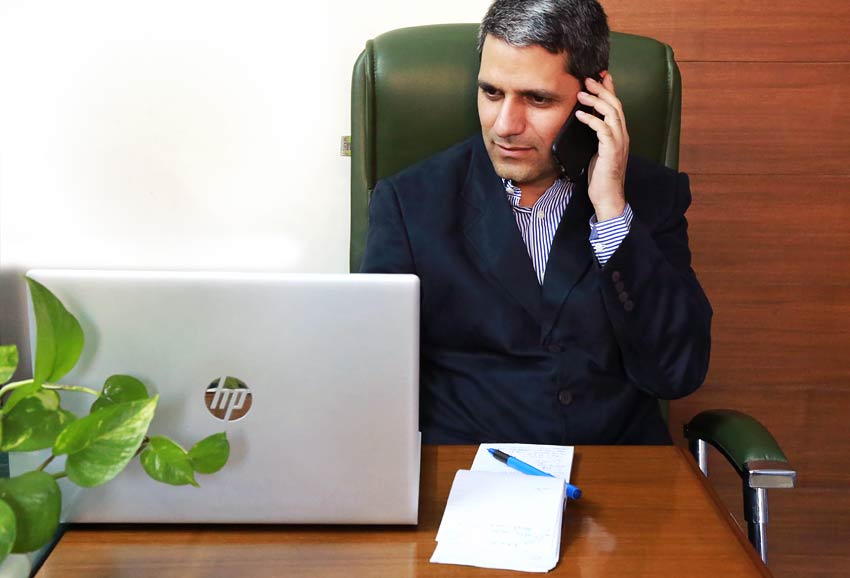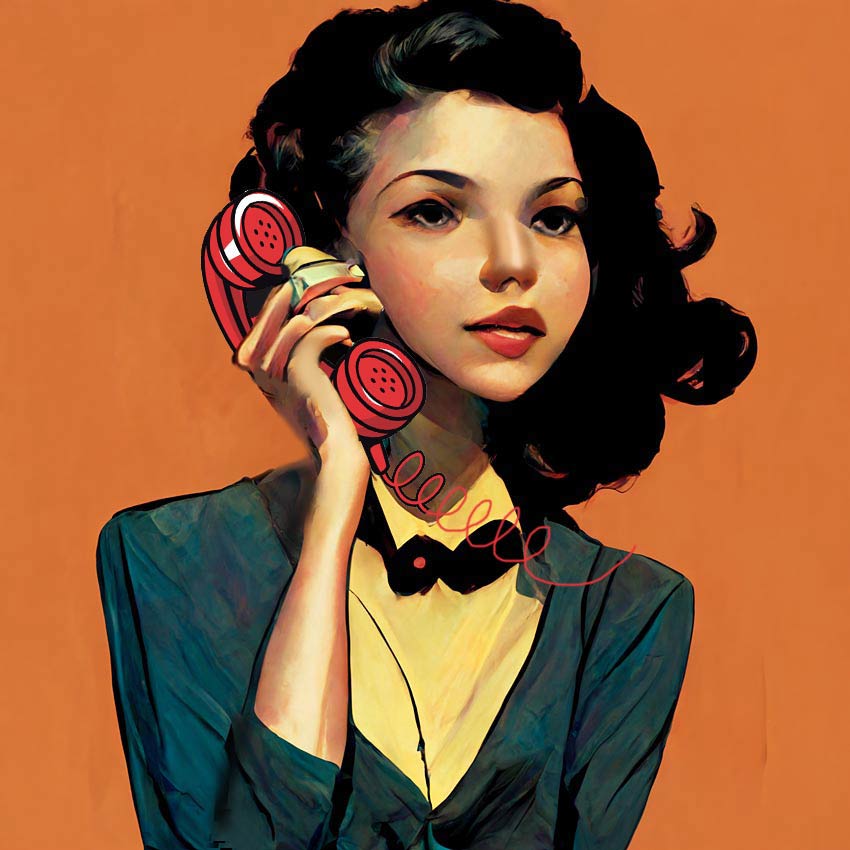From preparation to handling tricky situations, here’s the complete guide on how to do a telephonic interview. Ace it with these phone interview tips!

In the 15 years since I graduated from college, I’ve had a lot of experience both with giving and taking interviews over the phone. Before I became an entrepreneur, I changed a few jobs and that made me spend months applying and interviewing. And now, as we look for good candidates continuously at Shilpa Ahuja Media, I have to spend much of my time interviewing prospective candidates. Some phone interviews go well, and some don’t, which are the ones that gave me inspiration for writing this article.
Candidates sometimes make mistakes unknowingly, or don’t handle situations well, or sometimes they are plain rude. So if you’re a young professional seeking a job you’re really interested in, knowing how to do a phone interview can be very helpful in securing that position, sometimes even before you meet your interviewer face-to-face.
The Complete Guide to Giving the Perfect Phone Interview
Phone interviews can be tricky and nerve-wracking. Without being in their office, it’s hard to judge the company’s work environment. And without seeing the interviewer’s expressions, it’s difficult to know whether to be friendly, cheerful or serious! That makes it doubly tricky to let them see your personality or to communicate whether (or how much) you’re interested in the job.

While there are some pros to them – you don’t have to worry about getting dressed or running to find an office building. But then there are so many things that can go wrong – what if their call can’t get through, what if they don’t call at all, what if they ask something tricky, what if you don’t understand their accent! All this makes phone interviews complicated and sometimes, awkward.
So to make it easier for all you interviewees, I have compiled a list of possible things that can go wrong, along with basic phone interview tips, etiquette and how to handle everything from scheduling to follow-ups to rejections (hope you don’t get them though)!
1. Before the Interview: Scheduling a Phone Interview
• Set Your Expectations: A phone interview is usually the first interview. So don’t go in expecting to get a job offer straight away. A face-to-face second interview may be planned if you’re shortlisted.
• Recheck Your Application: Hopefully you will have sent in your resume and any other required documents beforehand, so double check, if you haven’t already, that you’ve sent in the correct information. This is one of the most important phone interview tips. Avoid sending false information in your resume at all costs. If you notice any errors in your application, send a revision promptly.
Also read: Basic Resume Writing Tips for Students
• State if You’re Unavailable: If the suggested interview timing doesn’t suit you, it’s better to be honest than be late or miss the call. State your reason for unavailability in an honest, professional manner, and request/suggest possible time slots. Such as, “Unfortunately, I’m unavailable on Wednesdays at 3pm because I have French classes every Wednesday and Thursday from 3-5pm. Would it be possible for you to schedule the interview at any other time?” or “Unfortunately, work hours during weekdays wouldn’t be possible for me due to my current job. Would it be okay to schedule an interview on Saturdays/Sundays or after 7pm any day?” Apologize for the inconvenience and state that you look forward to hearing from them.
• Verify Your Number: Here’s another one of the overlooked phone interview tips. Be sure the phone number you’ve mentioned in your resume or email signature works. If you’d like to be called on a different number, be sure to specify that as soon as you get confirmation for your interview.

2. Before the Interview: How to Prepare for a Phone Interview
Among the top phone interview tips has to be researching. Here’s how to research, prepare & be ready.
• Research: Your preparation for a phone interview doesn’t need to be much different than that for a regular interview. As if goes for any other interview, do a thorough research about the company, read the job profile and look up your interviewer’s profile on LinkedIn or the company’s team page.
• Prepare: Think of the possible questions you may be asked and jot down the important points you may like to mention about your resume.
• Practice: It’s always a good idea to practice the “about yourself” part with a friend or family member beforehand. Ask for helpful tips or opinions from them.
• Be Ready: Be ready at the scheduled time in a calm, distraction-free environment, preferably at your home. Avoid placing yourself in the vicinity of people, traffic or anything that may be noisy.
• Ensure You Can Receive the Call: Be sure that your phone is charged and has good reception, so the call isn’t interrupted in the middle of your interview.
• Have Documents Ready: Have a copy of your resume and your laptop open in front of you, in case you’re asked something that refers to it. Make sure to put the laptop on mute so any pop-ups or notifications don’t cause interruptions.

3. If Something Goes Wrong with the Call
There are so many instances of miscommunications or missed calls, so here are some helpful phone interview tips to handle those troubles.
• Handling Miscommunications 1: If they call at the wrong time or day, mention that politely. Ask if it would be possible for them to reschedule or call at the scheduled time, so that you can be better prepared. If you’re ready and available, there’s no harm in giving the interview. They’ll appreciate your spontaneous and proactive nature.
• Handling Miscommunications 2: If you got busy and forgot about the interview, or misread the timings, take the call anyway and explain honestly. Apologize earnestly, and let them know that you’re very interested in this position and you’d really appreciate a reschedule. Don’t suggest an alternate timing to suit yourself. Ask them and let them suggest it. If they promise to reschedule but you don’t hear back, email to follow up in two days.
• Handling Missed Interview 1: If you don’t receive the call, it’s a good idea to call the office number, and explain to your interviewer’s assistant or receptionist that you were expecting one. Email them for a polite reminder and ask when you can expect their call. Avoid calling the interviewer on their private number.
• Handling Missed Interview 2: If you missed the call for a phone interview for any reason, email them as soon as possible and state your reason honestly. Apologize sincerely. Request a reschedule and let them know you’d really appreciate a second chance.
4. During the Interview: Basic Phone Interview Tips
The actual interview time is the most nerve-wracking part. Here are some phone interview tips that can help you not mess it up, and ensure you get the next round!
How to Answer the Phone for a Phone Interview
• Answering the Call: Don’t answer the call with a question “Hello?” It’s best to answer with your name, or a cheerful hello or good morning. This will communicate that you’re ready, and not surprised.
• Have an Enthusiastic Tone: When they mention their name and appointment, don’t sound surprised, even if you’re nervous. This is another one of the uncommon phone interview tips I can give based on multiple personal experiences.
• Addressing the Interviewer:Don’t assume during the first phone conversation that it’s okay to address the interviewer by their first name. Address them as Mr. Smith or Ms. Clark. If you’re unsure how to pronounce their name, avoid saying it as much as possible, and address them as Sir, Miss or Ma’am, until they say it’s okay to call them by their first name (and then hear how they pronounce it.)
• Introducing Yourself: When asked to introduce yourself, take about 1-3 minutes to do so. Don’t make it too quick or too long. Walk them through your education or professional background. If you have any experience in handling tasks similar to those mentioned in the job profile you’re applying for, mention that. Add anything else that may be relevant but no more than that.
How to Do a Phone Interview and Phone Interview Etiquette
• Answering Questions: Be precise and stick to the relevant facts. Avoid going into long monologues. Avoid cheeky replies or cracking jokes.
• Speaking Etiquette: One of the most important phone interview tips to know. Wait for your turn to talk and avoid cutting in when your interviewer is speaking. If you do so by mistake, stop, apologize and let them finish.
• Tone of Conversation: Keep it professional, enthusiastic and alive. Don’t sound groggy or inattentive. Don’t try to make friends with the interviewer. However, it doesn’t hurt to have a friendly or comfortable tone.
• Showing Your Interest: Let your attentiveness, interview prep and tone of enthusiasm show that you’re interested in the position. You can also say, “I’m quite excited to be considered for this position.” Showing your interest is considered a good sign by most interviewers.
• Asking Questions: Wait for your turn to ask questions. Don’t ask anything which is already mentioned in the job description or company page. Avoid asking personal questions about the interviewer. Ask if you have any doubts about the job profile.
• Asking Tricky Questions: If you have any doubts about the work environment, such as work hours, leave policy, etc. it’s OK to ask that. Keep it polite and state your reason for asking it.
5. During the Interview: Tackling Tricky Questions
Every interview may have some tricky questions. Here are some phone interview tips to handle those.
• Talking About Salary Expectations: Usually the tricky part of any interview. The good news is, most interviewers only ask this if they’re serious about hiring you. That’s why this question usually pops up towards the end of the interview. If you’re asked to specify your current salary, it’s a good idea to disclose it honestly. If salary is a huge criteria for you, state your expectations in an honest range, without sounding too inflexible. If you’re clueless about the salary standards for this job profile, a good answer could be, “I’ll be happy to accept whatever your company’s standard pay-scale is for this position.” If salary is not your first priority, let them know that and state you’re really looking forward to get good experience.
• If You’re Asked About Something You Miscommunicated in Your Resume: Don’t sound lost or confused. If they’re asking about something you mistyped, apologize for the mistake and let them know the answer. If it is about something you false wrote in the resume, be honest about it and apologize sincerely for the error. Tell them about what it was meant to be instead.
• If They Ask Something You’re Not Comfortable Answering: Give a polite answer. If it’s something personal, say so. If you really can’t answer, let them know the reason politely and honestly.
6. Ending the Interview
It’s kinda simple, but here are some basic phone interview tips for ending your call in a good way.
• Who Ends the Interview: Let the interviewer suggest when it’s over. If you try to end the interview abruptly, it can be taken as a huge red flag.
• What to Say Towards the End: “Thank you for considering me,” and “It was a great pleasure speaking with you” are both good lines to use. Let them know you’ll be looking forward to hearing from them again.
7. After the Interview: Following Up
Following up properly is one of the most important phone interview tips. I’ve learned this after so many times I sadly have had to reject candidates solely because their lack of proper follow-up indicates lack of interest and enthusiasm to me.
• Thank You Note: Email within 2-12 hours after your interview is over and thank them for considering you. State that you’re looking forward to hearing back.
• Follow Up: If you haven’t heard from the interviewer in a week, follow-up and let them know you’re looking forward to hear back.
• Sending Extra Documents: If you’re asked to send in extra documents, do so promptly. Interviewers are usually considering multiple candidates, and any delay in completing your application may make them choose someone else over you.

• Follow-Up Questions: If you have any extra questions, don’t hesitate to email the interviewer or HR manager with them.
8. Handling Rejection or Rejecting the Job Offer
Rejections are always hard, no matter who’s handling it. It could be you or your recruiter. Here’s the best phone interview tips on how to do it properly.
• Handling Rejection: During or after the interview, if they clearly state a rejection for any reason, accept professionally and thank them for considering you. Let them know you’d be interested in any future openings that match your profile.
• Rejecting the Job Offer During Interview: If during the interview, you’re sure you won’t be accepting any job offer, say so politely with a line like, “Unfortunately, I will not be able to consider this position because (reason). I’ll certainly get in touch if my situation changes.”
• Rejecting the Job Offer After Interview: If you’ve been offered a job but you can’t take it, email them stating your reason. If they’ve stated something in the job offer that is making you change your mind, like salary or work timings, suggest possible alternatives.
Whatever the case may be, be prompt, be professional and be honest. It’ll go a long way in establishing your professionalism in the industry.
All the best!
Read next:
– How Should a Student Prepare for Campus Placement?
– How to Find an Internship in India and What to Expect

Shilpa Ahuja is the editor of Career Nuts. She has a Masters in Design Studies (MDesS) degree from Harvard University Graduate School of Design, class of 2011.
Shilpa is an entrepreneur and founder of Shilpa Ahuja Digital Media, an online publishing company that includes HowtoGetinto-Harvard.com, a Harvard admissions guide, ShilpaAhuja.com, one of India’s most-read digital fashion magazine, OpiniOwn.com, a social publication and Decorisk.com, a digital interior décor magazine. She is also the creator of Audrey O., a comic series that represents the lifestyle of millennial women.
She also has a bachelor’s degree in architecture from Chandigarh College of Architecture (B.Arch), class of 2007. She has worked in interior project management for The Park hotels and in graphic design and education technologies for Harvard Law School.
Originally from Chandigarh, Shilpa enjoys art, creative writing, fashion and travel. Her art has been exhibited at Harvard Graduate School of Design and the Aroma Hotel, Chandigarh. Her work has been published in University of Fashion blog, Jet Airways magazine, Chandigarh Times and Indian Design & Interiors magazine. She is also the author of the book “Designing a Chinese Cultural Center in India”.
